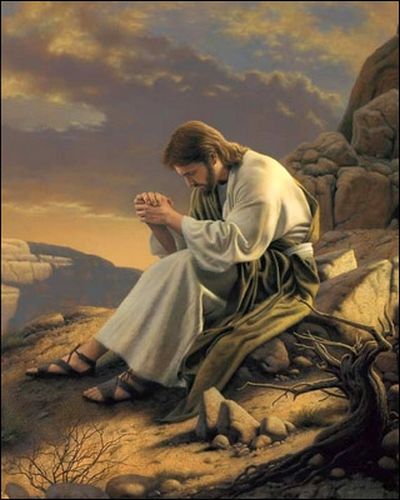Jesus departed to the mountain to pray, and he spent the night in prayer to God. When day came, he called his disciples to himself, and from them he chose Twelve, whom he also named Apostles: Simon, whom he named Peter, and his brother Andrew, James, John, Philip, Bartholomew, Matthew, Thomas, James the son of Alphaeus, Simon who was called a Zealot, and Judas the son of James, and Judas Iscariot, who became a traitor.
And he came down with them and stood on a stretch of level ground. A great crowd of his disciples and a large number of the people from all Judea and Jerusalem and the coastal region of Tyre and Sidon came to hear him and to be healed of their diseases; and even those who were tormented by unclean spirits were cured. Everyone in the crowd sought to touch him because power came forth from him and healed them all.
Luke 6:12-19
Let us examine then in the actions which Jesus did, how He teaches us to be instant in prayer to God, going apart by ourselves, and in secret, no one seeing us; putting aside also our worldly cares, that the mind may be raised up to the height of divine contemplation and this we have marked in the fact, act, that Jesus went into a mountain apart to pray.
Everywhere also He prays alone, for human wishes comprehend not the wisdom of God; and no one can share the secrets of Christ. But not everyone who prays ascends a mountain, he only who prays advancing from earthly things to higher, who is not anxious for the riches or honors of the world. All whose minds are raised above the world ascend the mountain. In the Gospel therefore you will find, that the disciples alone ascend the mountain with the Lord. But you, O Christian, have now the example which you should imitate; as it follows, "And he continued all night in prayer to God." For what ought you to do for your salvation, when Christ continues all night in prayer for you?
Rise then at night time. The soul is then purer, the very darkness and great silence are in themselves enough to lead us to sorrow for our sins. But if you look upon the heaven itself studded with stars as with unnumbered eyes, if you think that they who wanton and do unjustly in day time are then nothing different from the dead, you will loathe all human undertakings. All these things serve to raise the mind. seeking glory then disquiets not, no tumult of passion has the mastery; fire does not so destroy the rust of iron as nightly prayer does the blight of sin. He whom the heat of the sun has fevered by day is refreshed by tile dew; nightly tears are better than any dew, and are proof against desire and fear. But if a man is not cherished by the dew we speak of, he withers in the day. Wherefore although you pray not much at night, pray once with watching, and it is enough; show that the night belongs not only to the body, but to the soul.
Do you see what is best for you to do when you would commence any work of piety, when Christ, about to send out His disciples, first prayed? For it follows, "And when it was day, he called his disciples, etc." whom He truly destined to be the means of spreading the salvation of man through the world. Turn your eyes also to the heavenly council. Not the wise men, not the rich, not the noble, but He chose to send out fishermen and publicans, that they might not seem to turn men to their grace by riches or by the influence of power and rank, and that the force of truth, not the graces of oratory, might prevail.
References:
Catena Aurea (St. Thomas Aquinas)
Glossa Ordinaria
Commentary on the Gospel according to Saint Luke (St. Ambrose of Milan)
Commentary on Luke, Sermon XXIII (St. Cyril of Alexandria)
Homily 36 on the Acts of the Apostles (St. John Chrysostom)
